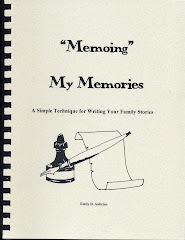Yes, Edit—that four-letter-word which keeps many from writing and others with constant migraines. In Farewell to Arms, Hemmingway wrote the last page 39 times. When asked about this, his comment was that he did so to get it right. This may be a bit extreme, but editing takes more than one or two attempts at revising.
All of us want to leave behind our very best work. That is our vanity. However, your descendants will be grateful for whatever you write. You may choose just to write your memories and stop there, or you may wish to edit your stories and be confident readers clearly understand.
For memoir writing you should not use words to impress your reader, but rather use your natural language. Do not use words beyond your best vocabulary unless the words clarify your meaning more precisely. Your natural language is your everyday expressions, the vernacular. This natural language is used in informal situations and gives your personal history color, individuality, and variety. Even when writing dialog, use the essence of the actual speaker. Capture their personality and attitude. Editing is still important when we use the vernacular.
The language for your stories should be consistent with the tone of the events. Humor is written with a different tone than is a spiritual experience, one being light hearted with the use of hyperbole (exaggeration) while the other more sober and formal.
After writing your first draft, keeping the above tips in mind, you are ready to edit. That four-letter-word for writing is often one which is neglected for many reasons. Most people really do not know how to edit. They do not know where to begin nor understand that editing differs from proofreading.
The goal of editing is to make your reading more easily read. You must use language in a way that you do not call attention to the language, but leave the focus on the story. Language should clarify the meaning you wish to convey. The attention should be on what you wish to express and not how you express it. However, clarity is required for that result.
Books have been written on the many approaches to editing, but with the limited space of a blog, only highlights can be addressed. For the next few articles, various aspects of editing will be examined in more detail. The areas covered are as follows:
.............Educate yourself on grammar and punctuation rules.
.............Draft as many versions as needed for clarity.
.............Incorporate word and sentence variety.
.............Take time to read your story aloud.
Editing takes time. If you feel overwhelmed in the process, just focus on particular sections or aspects of the procedure. As you attempt to edit using the various methods, you will become more aware of proper writing, and you will improve the first few drafts as well as your over all writing. After corrections have been made, you will see your personal writing style emerge. If you are interested in creating that final draft to ensure clarity of your stories, be patient and work methodically toward that end. Perfection takes time.
©Aulicino 5 Dec 2008
Friday, December 12, 2008
Subscribe to:
Post Comments (Atom)









No comments:
Post a Comment